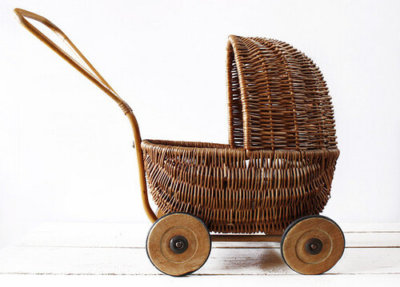When She or He Doesn’t Want Kids and You Do

By: Wicker Paradise
by Andrea M. Darcy
Uh oh. The ‘doesn’t want kids’ issue has raised it’s head, and you want them… What now?
First of all, know you are far from alone. A difference of opinion when it comes to kids is actually a common reason partners come to couples therapy.
How NOT to approach the ‘doesn’t want kids’ issue
It can become more a question of what NOT to do or say. Approaching this issue in the wrong way can cause long-term or permanent damage to your relationship and its trust levels. The below are things to avoid.
1. Don’t decide he or she will change their mind and just wait.
It’s not unheard of for people to change their mind on this issue. But it takes communication and solid personal work, not ignoring the issue. And it’s not something to count on.
This kind of ‘wait’ tactic leads to unhealthy behaviour, such as trying to be ‘the perfect partner’, as if you have to deserve their love and ‘win’ a family with them. This is codependency, and these kinds of thoughts stem from low self-esteem that can see you bitter in the long term.
There are practical caveats here. If your partner is young enough that doubt it normal, for example. Anyone under twenty-five is usually still working out who they are as an individual.
And if you just met someone in the last six months, it’s you they are still getting to know. It’s more than fair to ask their opinion on having a family in general, and a wise idea to ask this early. But demanding if they do

By: Chris W.
or don’t want children with you is not fair. Despite the modern day myth that love should be instant and certain, good relationships and trust take time. If you feel you don’t biologically have the time, you can’t blame your partner.
2. Don’t try to secretly manipulate him or her into changing their mind.
Planning on getting a pet to ‘wake up’ your partner’s parenting gene, or secretly arranging for your friends with kids to drop by more often?
Manipulating your partner is dishonest, and if they realise what is happening it can kill the trust between you. Is this the sort of parenting you had in mind, two parents who don’t trust each other?
Yes, it’s possible that raising a pet or spending more time with kids can give both of you more clarity on the kids issue. But it needs to be talked about honestly in advance as something you’d like them to try with an open mind.
As for ‘tricking’ your partner into having kids, such as lying about fertility days and safe sex, just don’t. A biological ticking clock can cause temporary moments of insanity, but try not to lose your integrity and self-respect in the process.
3. Don’t let the issue drop in the name of ‘sacrificing for love’.
Sacrificing your personal happiness is not romantic or ‘true love’, it’s self sabotage. It’s simply not healthy to put aside your own very normal desires and needs just to please someone else.
If your partner is seriously not willing to talk about the issue in depth, and refuses to even consider a compromise such as possibly adopting an older child, then it’s time to leave the relationship. And it’s a wise idea to find ways to build up your self-esteem or possibly see a counsellor, so you can be better at setting boundaries with the next partner.
Why therapy is a lifesaver for the kids question
Couples counselling helps in obvious ways. It helps you properly communicate, ask better questions, release emotions in a non-destructive way, and identify possible compromises (or accept they don’t exist).
But there are some surprising ways that therapy helps with deciding on kids.
- it removes any blocks that aren’t actually about kids at all.
- you learn the real reasons you do or don’t want kids.
- therapy removes the power game around the question you didn’t realise you were playing.
Biology, or values and beliefs?
Wanting or not wanting kids can be about a real, biological urge. Or it can be real personal values. Some of us, for example, really do value freedom and adventure more than family. But sometimes psychological issues mean we don’t actually know what we want as much as we claim.

By: carvalho
Deep-rooted negative core beliefs from childhood experiences often mean we have low self-esteem that makes parenting seem too hard. These beliefs sound like, ‘I’d be a terrible parent’, or ‘my child wouldn’t like me’.
Childhood trauma can leave you with real issues around safety and love. This is reflected in secret thoughts like, ‘loving someone is dangerous’, ‘it’s better to not be needed’, or ‘why have a child when bad things will happen to it’.
Are you using the kids conversation as a power move?
If your childhood has left you with a real fear of intimacy, you might even be using the kids issue as a sort of power move in your relationship, not even realising you are doing so. After all, having a different desire around kids than your partner is the perfect way to sabotage your relationship from deepening.
This shows up as someone who changes their mind constantly about kids, but always seems to have the opposing view to a partner. Or who claims they are sure about their thoughts on wanting kids but then conveniently always choose partners who don’t.
So yes, therapy can be surprising. Not just for your partner who isn’t certain about kids, but for you, too. Some people find in therapy they don’t want kids as much as they claim.
If you are 100% certain that you want kids, at the very least therapy helps you look at your limiting beliefs about loving and being loved. Perhaps it’s time to move past the fear that there is only one person in the world who can love you enough and you must stay in a relationship with someone who doesn’t want kids.
Harley Therapy puts you in touch with warm and experienced therapists and couples counsellors in central London. If you aren’t in the UK, did you know that you can now do couples counselling online?
 Andrea M. Darcy is a mental health and wellbeing expert and personal development teacher with training in person-centred counselling, as well as a popular psychology writer. She wasted six good years with someone who didn’t want kids and lived to regret it, so knows what she is talking about! Follow her on Instagram for encouragement and useful life tips @am_darcy
Andrea M. Darcy is a mental health and wellbeing expert and personal development teacher with training in person-centred counselling, as well as a popular psychology writer. She wasted six good years with someone who didn’t want kids and lived to regret it, so knows what she is talking about! Follow her on Instagram for encouragement and useful life tips @am_darcy




